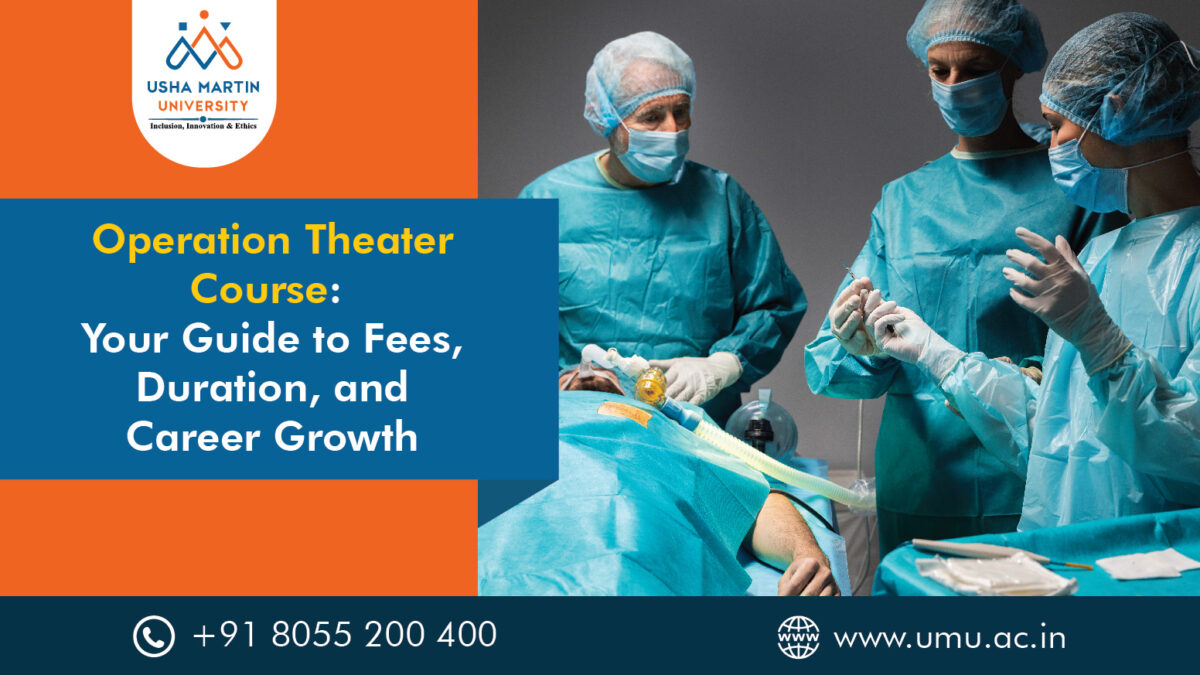
Radiology Course After 12th: Eligibility, Curriculum, Application, Placement
November 10, 2024
Everything You Need to Know: Ph.D. Programs, Eligibility, and Admission Procedure
November 12, 2024Introduction to the Operation Theater Course –
The OT course (B.Sc. OTT) is a graduate degree course with a duration of three years. This course focuses on preparing students to become competent Operation Theater Technicians. They are responsible for managing and assisting in surgical procedures, maintaining a sterile environment, and ensuring that the surgical instruments and equipment are properly handled.
Through a blend of theoretical lessons and hands-on training, students gain a deep understanding of surgical techniques, sterilization procedures, patient care, and the operation of advanced medical equipment used in modern surgical settings. Students of this course can pursue careers in hospitals, clinics, and other healthcare institutions, playing a crucial role in the smooth and safe execution of surgeries.
Course Curriculum Operation Theater (OT) Course –
The Operation Theater (OT course) curriculum at Usha Martin University is designed to provide students with an understanding of the various aspects of operating room management and surgical support. The curriculum is structured to combine theoretical knowledge with practical experience, ensuring students are well-prepared for careers in the healthcare sector.
The following are some of the core subjects thought in the course –
- Human Anatomy
- Physiology
- Hematology & Blood –Banking
- Introduction to Operation Theatre Technology
- Applied Microbiology
- Mathematical Optimization
Duration of the Operation Theater (OT) Course –
The OT course admission at Usha Martin University typically spans 3 years. These 3 years are focused on various disciplines of diagnostic and therapeutic surgical interventional procedures performed in the operating theatre.
Fees for Operation Theater (OT) Course –
Usha Martin University offers the OT course with an affordable and flexible fee structure, making quality education accessible to a wider student base. The university ensures that students receive comprehensive training in operation theater management, patient care, and surgical support, while also providing value for money through reasonable tuition fees and additional financial aid options. The students need to pay INR 279000, which includes registration fee (one time), semester fee (half yearly), exam fees (semester wise), training & development fees (one time), and caution money (refundable).
Admission Process at Usha Martin University –
The admission process for the OT course at Usha Martin University involves the following steps –
- Interested candidates can apply online through the official Usha Martin University website or visit the campus for offline application forms. Complete the application form by providing personal, academic, and contact details. For offline applications, the hard copy of the filled-out application needs to be sent through a registered course or courier. For online application, the process needs to be carried out through the official website.
- Submit necessary documents. The documents need to be uploaded in cases of online application or sent through registered course or courier along with the application form.
- An application fee needs to be paid during the application process. The fee can be paid through online mode (online application) or through DD (offline application).
- Once the applications are received, the admissions department scrutinizes the applications for suitability.
- Students whose applications are found suitable receive an email for further admission process.
Placement Support at after Operation Theater Course –
Usha Martin University is committed to ensuring that its students are well-prepared for the job market. Through comprehensive placement support, including career counseling, skill development programs, and strong industry connections, UMU enhances the employability of its graduates, helping them embark on successful career paths.
Career Growth After Completing the Operation Theater Course –
After completing an Operation Theater course from Usha Martin University, students can pursue a range of rewarding career opportunities in the healthcare sector. This program equips students with specialized skills in managing and assisting in surgical environments, making them valuable assets in medical facilities.
Here are some key career paths and opportunities available –
- OT Assistant – Their primary responsibilities involve preparing and maintaining the operating theater environment to ensure that surgical procedures are conducted safely and efficiently.
- Surgical Assistant – Their role is to assist surgeons during surgical procedures. Their responsibilities are important for ensuring the safety and efficiency of surgical operations.
- Anesthesia Technician – They assist anesthesiologists and nurse anesthetists in preparing for and administering anesthesia to patients undergoing surgical procedures.
- Emergency Medical Technician (EMT) – They are the healthcare professional trained to provide immediate medical care in emergency situations.
- OT In-Charge – Their role is to manage the operations and activities within an operating theater.
- Clinical Educator – They are responsible for providing education and training to clinical staff, including nurses, allied health professionals, and other healthcare workers.
- Medical Equipment Specialist – They are responsible for managing, maintaining, and ensuring the proper functioning of medical equipment used in healthcare settings.
- Healthcare Administrator – A Healthcare Administrator is a professional responsible for overseeing the operations and management of healthcare facilities, such as hospitals, clinics, nursing homes, and other healthcare organizations.
Industry Demand for Operation Theater Professionals –
The healthcare industry has witnessed a significant increase in demand for skilled Operation Theater (OT) professionals due to advancements in surgical procedures, rising healthcare infrastructure, and a growing emphasis on patient safety. OT professionals, including OT Technicians and Surgical Assistants, play a critical role in ensuring the smooth operation of surgical procedures by maintaining a sterile environment, handling specialized equipment, and providing essential support to surgeons and anesthesiologists.
With the expanding network of hospitals, specialty clinics, and surgical centers, there is a pressing need for qualified OT professionals who are trained to manage the complexities of modern operating rooms. This demand offers promising career prospects and job stability for individuals pursuing qualifications in OT technology.
Conclusion –
The OT assistant course offers aspiring healthcare professionals a pathway to a rewarding and dynamic career in the surgical field. With a curriculum that combines theoretical knowledge and practical training, students are well-prepared to meet the growing demands of the healthcare industry. The course not only provides insights into the essential skills needed for effective operation theater management but also highlights the importance of patient safety and care during surgical procedures.






